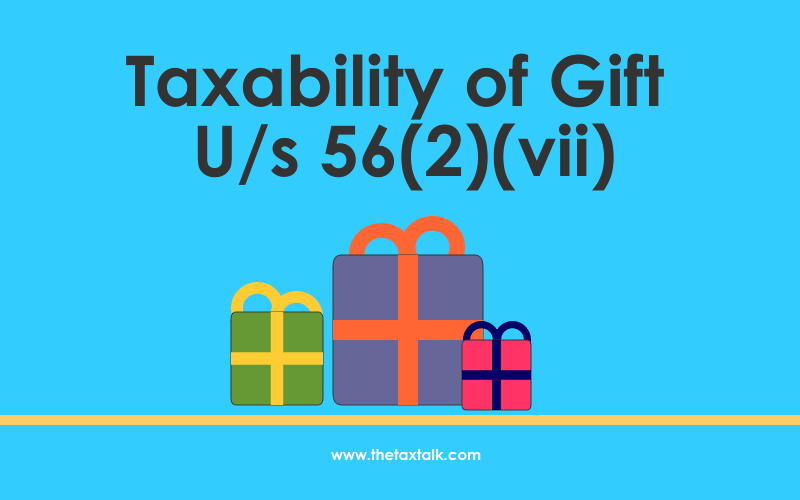![]()
Taxability of Gift U/s 56(2)(vii)
Gift is usually used to covert black money into white money. To stop practice of converting black money into white money a section 56(2)(vii) introduced by Finance Act, 2009 and amended by Finance act, 2010. This section deals with law of taxation gift.
Explanation to the provision sec 56(2)(Vii)–
Where an individual or HUF receives during the previous year, from any person or persons-
- Any sum of money, without consideration, the aggregate value of which exceeds Rs. 50000/- the whole of the aggregate value is taxable,
- Any immovable property, –
- Without consideration, the stamp duty value of which exceeds Rs.50000/-, the stamp duty value of such property is taxable,
- Received for a consideration which is less than the stamp duty value of the property and difference is more than Rs. 50000/- then such difference is taxable.
- Any property other than immovable property, –
- Without consideration, the aggregate fair value of which exceeds Rs. 50000/-, the whole of the aggregate fair market value is taxable,
- Received for a consideration which is less than the aggregate fair value of the property and the difference is more than Rs.50000/- then such difference is taxable.
Analysis of section – 56(2)(vii) Read with section of capital Gain Section 50C, sec47
- Any transfer of capital asset under gift, will or an irrevocable transfer is not taxable under head capital Gain. It is not regarded as transfer U/s 47.
- Any distribution of capital assets on the partial or total partition of a HUF is not taxable under head Capital Gain. Because it is not regarded as transfer U/s 47
- As per Sec-50C where the consideration received or accruing as a result of the transfer by an assessee of a capital asset, being land or building or both, is less than the value adopted or assessed or assessable by the authority of the state government for the purpose of payment of stamp duty, such value deemed as full consideration.
Stamp duty of which date is to be taken?
Normally, stamp value as on the date of registration is to be taken.
However, if the following conditions are satisfied, the stamp duty value may be taken as on the date of agreement instead of date of registration:
- The date of the agreement fixing the amount of consideration for the transfer of the immovable property and the date of registration are not same, and
- Whole or part of the of the consideration has been paid by way of an account payee cheque or by an account payee bank draft or by use of ECS through a bank account on or before the date of agreement.
Exemptions in relation to Gift
Provided further that Sec 56(2)(Vii) does not apply to any sum of money or any property received-
- From any relatives, or
- On the occasion of the marriage of the individual, or
- Under a will or by way of inheritance, or
- From any local authority, or
- From any trust or institutions registered under section 12AA of income tax
act.
- In contemplation of death of the payer or donor
Property for this purpose includes:
- Immovable property being Land & Building or both,
- Shares & Securities
- Jewellery
- Archaeological collection,
- Drawings,
- Sculptures,
- Any work of art,
- Bullion

